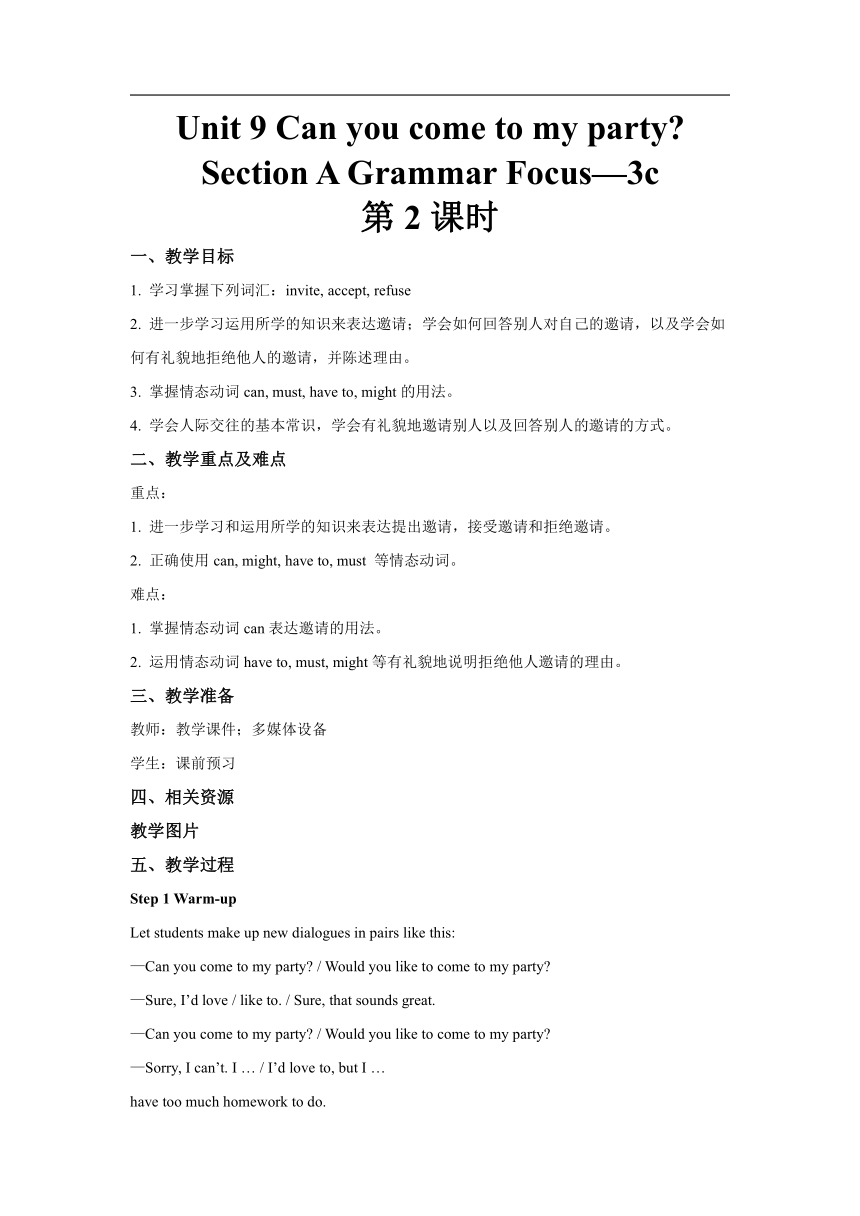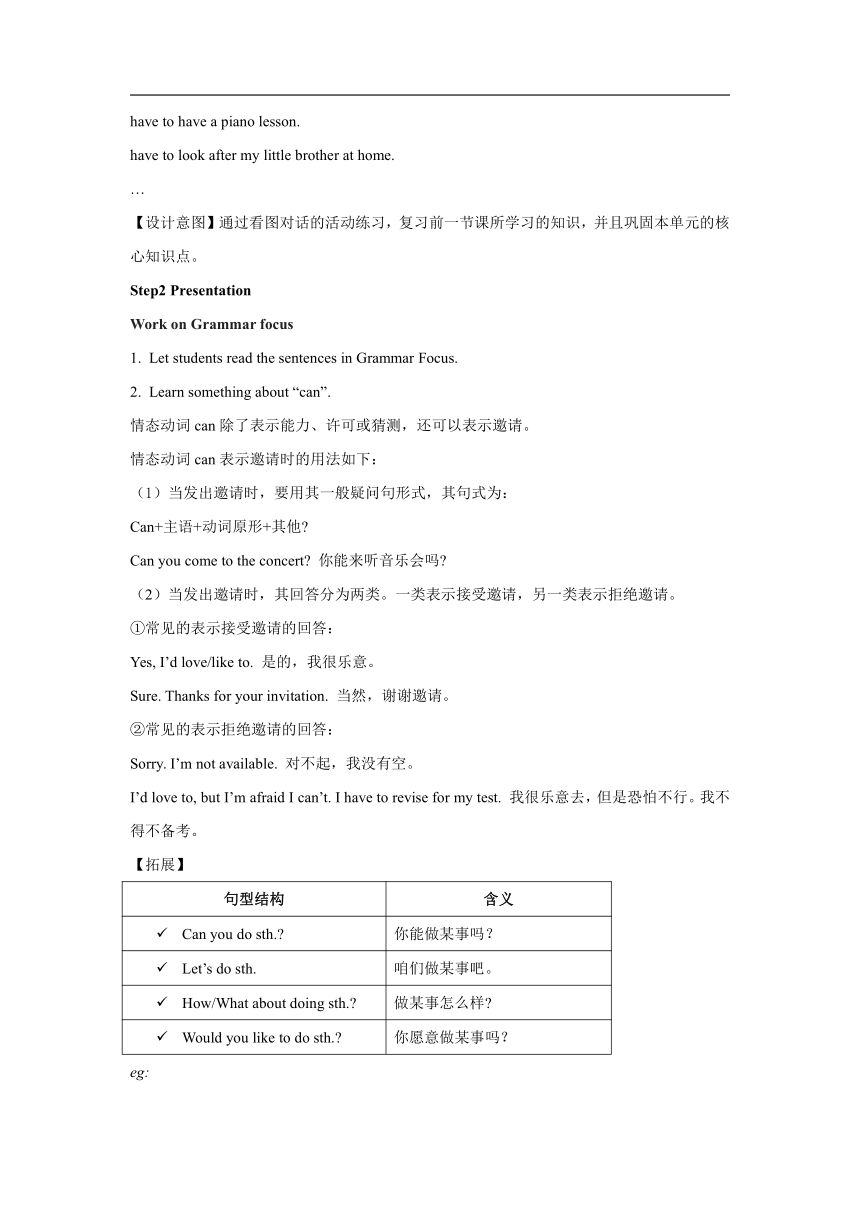Unit 9 Can you come to my party? Section A Grammar Focus-3c教案
文档属性
| 名称 | Unit 9 Can you come to my party? Section A Grammar Focus-3c教案 |  | |
| 格式 | docx | ||
| 文件大小 | 26.9KB | ||
| 资源类型 | 教案 | ||
| 版本资源 | 人教新目标(Go for it)版 | ||
| 科目 | 英语 | ||
| 更新时间 | 2021-11-22 13:15:30 | ||
图片预览



文档简介
Unit 9 Can you come to my party
Section A Grammar Focus—3c
第2课时
一、教学目标
1. 学习掌握下列词汇:invite, accept, refuse
2. 进一步学习运用所学的知识来表达邀请;学会如何回答别人对自己的邀请,以及学会如何有礼貌地拒绝他人的邀请,并陈述理由。
3. 掌握情态动词can, must, have to, might的用法。
4. 学会人际交往的基本常识,学会有礼貌地邀请别人以及回答别人的邀请的方式。
二、教学重点及难点
重点:
1. 进一步学习和运用所学的知识来表达提出邀请,接受邀请和拒绝邀请。
2. 正确使用can, might, have to, must 等情态动词。
难点:
1. 掌握情态动词can表达邀请的用法。
2. 运用情态动词have to, must, might等有礼貌地说明拒绝他人邀请的理由。
三、教学准备
教师:教学课件;多媒体设备
学生:课前预习
四、相关资源
教学图片
五、教学过程
Step 1 Warm-up
Let students make up new dialogues in pairs like this:
—Can you come to my party / Would you like to come to my party
—Sure, I’d love / like to. / Sure, that sounds great.
—Can you come to my party / Would you like to come to my party
—Sorry, I can’t. I … / I’d love to, but I …
have too much homework to do.
have to have a piano lesson.
have to look after my little brother at home.
…
【设计意图】通过看图对话的活动练习,复习前一节课所学习的知识,并且巩固本单元的核心知识点。
Step2 Presentation
Work on Grammar focus
Let students read the sentences in Grammar Focus.
Learn something about “can”.
情态动词can除了表示能力、许可或猜测,还可以表示邀请。
情态动词can表示邀请时的用法如下:
(1)当发出邀请时,要用其一般疑问句形式,其句式为:
Can+主语+动词原形+其他
Can you come to the concert 你能来听音乐会吗
(2)当发出邀请时,其回答分为两类。一类表示接受邀请,另一类表示拒绝邀请。
①常见的表示接受邀请的回答:
Yes, I’d love/like to. 是的,我很乐意。
Sure. Thanks for your invitation. 当然,谢谢邀请。
②常见的表示拒绝邀请的回答:
Sorry. I’m not available. 对不起,我没有空。
I’d love to, but I’m afraid I can’t. I have to revise for my test. 我很乐意去,但是恐怕不行。我不得不备考。
【拓展】
句型结构 含义
Can you do sth. 你能做某事吗?
Let’s do sth. 咱们做某事吧。
How/What about doing sth. 做某事怎么样
Would you like to do sth. 你愿意做某事吗?
eg:
Can you come to my party 你能来参加我的聚会吗?
Let’s go shopping. 咱们去购物吧。
How about playing basketball 打篮球怎么样?
Would you like to have a rest 你想休息一会儿吗?
【设计意图】通过呈现本单元的重点句型,引导学生归纳本单元的知识点。
Step 3 Practice
Work on 3a
1. Read the phrases in the box in 3a. And then ask students to complete the answers with might and one of the phrases in the box.
2. Check the answers in pairs. Guide the students to understand that we can use “might” to make inferences.
【设计意图】通过用方框内的提示短语完成答语的活动,引导学生学会用might表示推测的正确表达。
Work on 3b
1. Ask students to complete 3b by themselves, using the words in brackets to help them.
2. Ask students to read the conversations to check the answers.
【设计意图】通过在提示词的帮助下完成对话的活动,引导学生学会用正确的表达方式提出邀请,接受邀请和拒绝邀请。
Step 4 Production
Work on 3c
Let students write down everything they have to do next week.
Choose a day and time to have a party. Then invite classmates to the party.
A: Can you come to my party
B: When is it
A: Next week, on Thursday night.
B: I’m sorry. I have to study for a math test.
Fill in the chart. Record who can come and who can’t come. If someone can’t come, write down the reasons.
Ask some students to report their results of the invitations like this:
I’m having a party on ... I’m glad … is / are going to my party, but … can’t come because he / she …
【设计意图】通过创设情景,培养学生在实际生活中正确运用发出邀请,接受或拒绝邀请的表达方式。
Step 5 Consolidation
Do some exercises to memorize it.
根据课本内容,完成下列句子。
1. 星期六你能来我的聚会吗?____ you ____ to my party on Saturday
2. 当然,我乐意去。Sure. ____ ____ ____.
3. 对不起,我必须为数学考试而学习。Sorry, I ____ ____ ____ a math test.
4. 明天晚上你能去看电影吗?____ you ____ to the movies _____night
5. 当然可以,听起来很棒。____, that ____ ____.
6. 恐怕不行,我得了流感。I’m ____ not. I have the ____.
7. 他能去聚会吗?____ he ____ to the party
8. 不能。他得帮助他的父母。No, he ____. He ____ to help his parents.
9. 她能参加棒球比赛吗? ____ she go to the baseball ____
10. 不,她没有空。她必须去看医生。
No, she’s ____ ____. She ____ ____ to the _____.
11. 他们能去看电影吗?____ they ____ to the _____
12. 不,他们没有空。他们可能必须去见朋友。
No, they’re not ____. They ____ ____ ____ meet their ____.
【设计意图】检测并强化学生对本课时内容的掌握。
Step 6 Summary
1. 学习掌握下列词汇:invite, accept, refuse
2. 进一步学习运用所学的知识来表达邀请;学会如何回答别人对自己的邀请,以及学会如何有礼貌地拒绝他人的邀请,并陈述理由。
3. 掌握情态动词can, must, have to, might的用法。
【设计意图】回忆本课所学并巩固。
Step 7 Homework
1. Memorize the words we have learned today.
2. Make up a conversation to invite your friends to your party.
【设计意图】通过不同方式复习巩固本课所学。
六、板书设计
Unit 9 Can you come to my party
Section A Grammar Focus—3c
第2课时
Can you …
Accept invitations: Sure, I’d love to. / Sure, that sounds great.
Refuse invitations: Sorry, I can’t. I … / I’d love to, but I …
have too much homework to do.
have to have a piano lesson.
have to look after my little brother at home.
…
Section A Grammar Focus—3c
第2课时
一、教学目标
1. 学习掌握下列词汇:invite, accept, refuse
2. 进一步学习运用所学的知识来表达邀请;学会如何回答别人对自己的邀请,以及学会如何有礼貌地拒绝他人的邀请,并陈述理由。
3. 掌握情态动词can, must, have to, might的用法。
4. 学会人际交往的基本常识,学会有礼貌地邀请别人以及回答别人的邀请的方式。
二、教学重点及难点
重点:
1. 进一步学习和运用所学的知识来表达提出邀请,接受邀请和拒绝邀请。
2. 正确使用can, might, have to, must 等情态动词。
难点:
1. 掌握情态动词can表达邀请的用法。
2. 运用情态动词have to, must, might等有礼貌地说明拒绝他人邀请的理由。
三、教学准备
教师:教学课件;多媒体设备
学生:课前预习
四、相关资源
教学图片
五、教学过程
Step 1 Warm-up
Let students make up new dialogues in pairs like this:
—Can you come to my party / Would you like to come to my party
—Sure, I’d love / like to. / Sure, that sounds great.
—Can you come to my party / Would you like to come to my party
—Sorry, I can’t. I … / I’d love to, but I …
have too much homework to do.
have to have a piano lesson.
have to look after my little brother at home.
…
【设计意图】通过看图对话的活动练习,复习前一节课所学习的知识,并且巩固本单元的核心知识点。
Step2 Presentation
Work on Grammar focus
Let students read the sentences in Grammar Focus.
Learn something about “can”.
情态动词can除了表示能力、许可或猜测,还可以表示邀请。
情态动词can表示邀请时的用法如下:
(1)当发出邀请时,要用其一般疑问句形式,其句式为:
Can+主语+动词原形+其他
Can you come to the concert 你能来听音乐会吗
(2)当发出邀请时,其回答分为两类。一类表示接受邀请,另一类表示拒绝邀请。
①常见的表示接受邀请的回答:
Yes, I’d love/like to. 是的,我很乐意。
Sure. Thanks for your invitation. 当然,谢谢邀请。
②常见的表示拒绝邀请的回答:
Sorry. I’m not available. 对不起,我没有空。
I’d love to, but I’m afraid I can’t. I have to revise for my test. 我很乐意去,但是恐怕不行。我不得不备考。
【拓展】
句型结构 含义
Can you do sth. 你能做某事吗?
Let’s do sth. 咱们做某事吧。
How/What about doing sth. 做某事怎么样
Would you like to do sth. 你愿意做某事吗?
eg:
Can you come to my party 你能来参加我的聚会吗?
Let’s go shopping. 咱们去购物吧。
How about playing basketball 打篮球怎么样?
Would you like to have a rest 你想休息一会儿吗?
【设计意图】通过呈现本单元的重点句型,引导学生归纳本单元的知识点。
Step 3 Practice
Work on 3a
1. Read the phrases in the box in 3a. And then ask students to complete the answers with might and one of the phrases in the box.
2. Check the answers in pairs. Guide the students to understand that we can use “might” to make inferences.
【设计意图】通过用方框内的提示短语完成答语的活动,引导学生学会用might表示推测的正确表达。
Work on 3b
1. Ask students to complete 3b by themselves, using the words in brackets to help them.
2. Ask students to read the conversations to check the answers.
【设计意图】通过在提示词的帮助下完成对话的活动,引导学生学会用正确的表达方式提出邀请,接受邀请和拒绝邀请。
Step 4 Production
Work on 3c
Let students write down everything they have to do next week.
Choose a day and time to have a party. Then invite classmates to the party.
A: Can you come to my party
B: When is it
A: Next week, on Thursday night.
B: I’m sorry. I have to study for a math test.
Fill in the chart. Record who can come and who can’t come. If someone can’t come, write down the reasons.
Ask some students to report their results of the invitations like this:
I’m having a party on ... I’m glad … is / are going to my party, but … can’t come because he / she …
【设计意图】通过创设情景,培养学生在实际生活中正确运用发出邀请,接受或拒绝邀请的表达方式。
Step 5 Consolidation
Do some exercises to memorize it.
根据课本内容,完成下列句子。
1. 星期六你能来我的聚会吗?____ you ____ to my party on Saturday
2. 当然,我乐意去。Sure. ____ ____ ____.
3. 对不起,我必须为数学考试而学习。Sorry, I ____ ____ ____ a math test.
4. 明天晚上你能去看电影吗?____ you ____ to the movies _____night
5. 当然可以,听起来很棒。____, that ____ ____.
6. 恐怕不行,我得了流感。I’m ____ not. I have the ____.
7. 他能去聚会吗?____ he ____ to the party
8. 不能。他得帮助他的父母。No, he ____. He ____ to help his parents.
9. 她能参加棒球比赛吗? ____ she go to the baseball ____
10. 不,她没有空。她必须去看医生。
No, she’s ____ ____. She ____ ____ to the _____.
11. 他们能去看电影吗?____ they ____ to the _____
12. 不,他们没有空。他们可能必须去见朋友。
No, they’re not ____. They ____ ____ ____ meet their ____.
【设计意图】检测并强化学生对本课时内容的掌握。
Step 6 Summary
1. 学习掌握下列词汇:invite, accept, refuse
2. 进一步学习运用所学的知识来表达邀请;学会如何回答别人对自己的邀请,以及学会如何有礼貌地拒绝他人的邀请,并陈述理由。
3. 掌握情态动词can, must, have to, might的用法。
【设计意图】回忆本课所学并巩固。
Step 7 Homework
1. Memorize the words we have learned today.
2. Make up a conversation to invite your friends to your party.
【设计意图】通过不同方式复习巩固本课所学。
六、板书设计
Unit 9 Can you come to my party
Section A Grammar Focus—3c
第2课时
Can you …
Accept invitations: Sure, I’d love to. / Sure, that sounds great.
Refuse invitations: Sorry, I can’t. I … / I’d love to, but I …
have too much homework to do.
have to have a piano lesson.
have to look after my little brother at home.
…
同课章节目录
- Unit 1 Where did you go on vacation?
- Section A
- Section B
- Unit 2 How often do you exercise?
- Section A
- Section B
- Unit 3 I'm more outgoing than my sister.
- Section A
- Section B
- Unit 4 What's the best movie theater?
- Section A
- Section B
- Unit 5 Do you want to watch a game show?
- Section A
- Section B
- Unit 6 I'm going to study computer science.
- Section A
- Section B
- Unit 7 Will people have robots?
- Section A
- Section B
- Unit 8 How do you make a banana milk shake?
- Section A
- Section B
- Unit 9 Can you come to my party?
- Section A
- Section B
- Unit 10 If you go to the party, you'll have a grea
- Section A
- Section B
